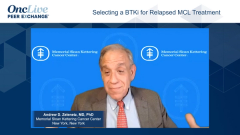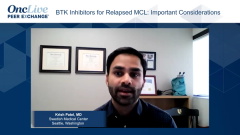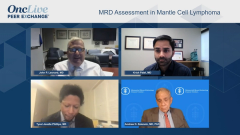
Acalabrutinib and Zanubrutinib for Relapsed MCL
Episodes in this series

John P. Leonard, MD: Krish, acalabrutinib is another BTK [Bruton tyrosine kinase] inhibitor I’m sure people are familiar with. What’s your take? Summarize for us briefly the general data with acalabrutinib in relapsed mantle cell lymphoma.
Krish Patel, MD: Acalabrutinib is approved based on a phase 2 trial called the ACE-LY-004. It’s an accelerated approval and no comparator for the single-arm study. In that study they reported very high response rates for the acalabrutinib, around 80% with half the patients achieving complete remissions assessed by PET [positron emission tomography] CT.
With the most recent updates of 24 months of follow-up data or so, the median progression-free survival is about 20 months. So you can have very durable responses to therapy, but you take away from that study as well that the toxicity profile for acalabrutinib appears to be distinct. We can’t really make cross-trial comparisons of different BTK inhibitors from the single-arm study, but there are low rates of atrial fibrillation and high-grade bleeding events. In general, acalabrutinib seemed to be well tolerated.
John P. Leonard, MD: Again I’ll ask Andy the ibrutinib question: Where do you use a BTK inhibitor? And second line, what’s your most common scenario?
Andrew D. Zelenetz, MD, PhD: BTK inhibitors very much become my preferred second-line therapy. In that regard, primarily based on toxicity profile I tend to use acalabrutinib most commonly.
John P. Leonard, MD: We now have access to zanubrutinib, an even newer option, and we’re starting to get some comparative studies—we’ll talk a little about comparison later. Tell us about your take on zanubrutinib and mantle cell.
Tycel Jovelle Phillips, MD: Echoing what Krish said about acalabrutinib, zanubrutinib is a second-generation BTK inhibitor, and it’s more specific for our intended target with fewer off-target adverse effects. As such, it also gives us the ability to play around with dosing. With zanubrutinib, we can dose it 160 mg twice daily or 320 mg daily, which is nice and convenient because obviously some patients are not very good at taking the medication twice a day. It was part of the argument some people have for ibrutinib over acalabrutinib as far as the dosing being a bit simpler for patients.
Toxicity-wise, at least the newer dogs have fewer spots, so zanubrutinib and acalabrutinib also all look a little better. And because ibrutinib, as Dr Zelenetz has mentioned, has been around for a long time, we know it works.
Over time, obviously we’ll be able to learn more about zanubrutinib, to see if any little late toxicities arise. But right now the toxicity profile looks pretty good. And if I’m prescribing the patient a BTK inhibitor, for the most part, aside from situations in which I want to make sure I get some CNS [central nervous system] penetration, most of what I’m prescribing is second generation. One is acalabrutinib- zanubrutinib. And mostly zanubrutinib lately because it doesn’t have some drug-drug interactions, so I don’t have to worry about dealing with PPIs [proton pump inhibitors] and switching patients off, which is an issue that sometimes comes with acalabrutinib.
John P. Leonard, MD: Newer dogs have fewer spots. We talked about regional differences of treatment. I like that expression. I’ll have to trot that out once in a while.
Transcript Edited for Clarity



















































